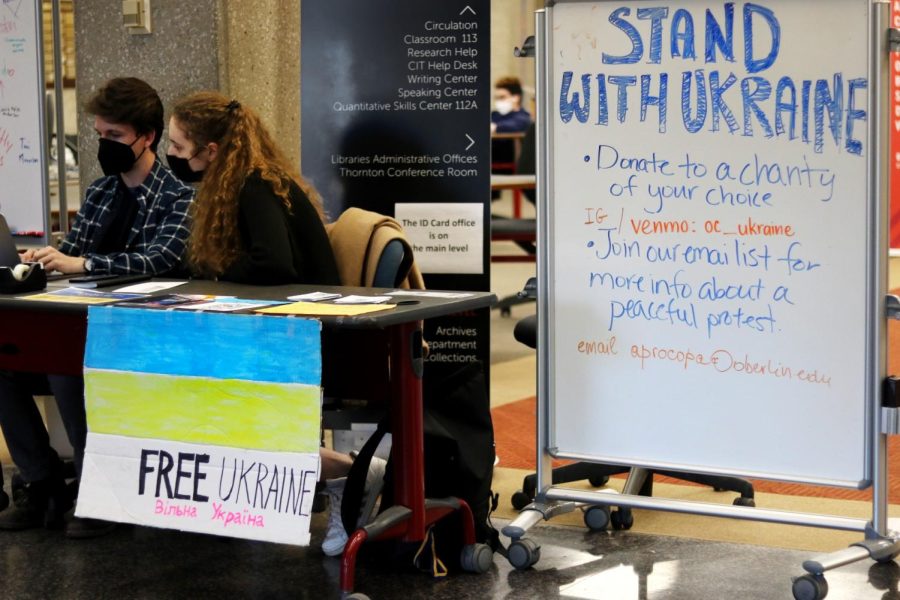Students Plan Protest, Fundraiser
Over the past week, students have held multiple fundraisers in Mudd Center to raise money for Ukrainians impacted by Russia’s invasion.
This Sunday at noon, students will hold a peaceful protest in Wilder Bowl in support of Ukrainian armed forces, state actors, and civilians resisting the Russian invasion. The upcoming protest is just one aspect of Oberlin students’ organizing efforts to aid Ukraine, which also include a series of fundraisers to support nonprofit organizations providing aid on the ground.
The invasion of Ukraine began Feb. 24 when Russian President Vladimir Putin announced a “special military operation” to “denazify” Ukraine, with Russia subsequently launching ground and air strikes against major Ukrainian cities. Since then, the invasion has spiraled into a severe humanitarian crisis with flagrant Russian violations of international law and hundreds of civilian casualties.
Money raised from the student-organized fundraisers will primarily go to Razom, a U.S.-based nonprofit that coordinates with peer organizations to distribute humanitarian aid. Student organizers will also donate funds they raise to Ukraine’s branch of the Red Cross, the Ukrainian armed forces, and Come Back Alive, an organization providing military personnel with training, supplies, and psychological support. Due to Ukraine’s current inaccessibility, organizations like these are currently distributing aid to Ukraine through hubs set up in bordering EU countries.
College third-year and Moldovan international student Andreea Procopan has taken on a large role in the organizing. She described how the Moldovan finance ministry is organizing distribution of aid to Ukrainian refugees.
“The finance ministry of Moldova set up an account where the funds go directly to Ukrainians coming in, and they’re actually giving debit cards to refugees,” she said. “Also, people [are] just showing up on the border offering hot meals and to transport people to wherever they need.”
Diana Tymochko, a College first-year who is also involved in campus organizing to aid Ukraine, explained what supply distribution looks like on the ground.
“My brother is staying with Polish Ukrainians who are volunteering in Poland right now, so they are buying stuff, they are shipping it to the border, then Ukrainian people are grabbing it at the border,” Tymochko said. “My neighbor in Ukraine, he is driving stuff to Kyiv as well, so our building and other people who know what’s happening, they just bring stuff, as much as they can — food, medicine, clothing — and then they all drive it to places where it’s relatively safe to drive, ’cause right now there’s a risk of getting shot in the car.”
Last week, over 250 students attended the Russian and East European Studies teach-in on the Russian invasion of Ukraine. Procopan noted how Oberlin students can continue to show concern for Ukraine despite their distance from the invasion.
“There was a good momentum at the teach-in, with people coming in, so it would be great to keep that type of interest and momentum going,” Procopan said. “And, just in terms of emphasis, if half of the student population donated $10, which is some people’s weekly Slow Train budget, we would already be hitting more than our initial goal.”
Tymochko also underscored the importance of supporting organizations like Razom which can directly donate goods rather than just money.
“In Ukraine, in a lot of stores, there isn’t stuff to buy anymore,” she said. “Even in Poland, I saw this volunteer [and] she says that even in Poland there are many stores where you can’t buy the needed medicine right now — the painkillers, mostly, and medicine for injuries.”
Fundraising efforts will continue into next week with a bake sale on the first floor of Mudd Center on Monday starting at 10 a.m. The sale is supported by Blue Rooster Bakehouse, and there will be a sliding scale for purchasing baked goods. Students can also donate through @OC_Ukraine on Venmo.







